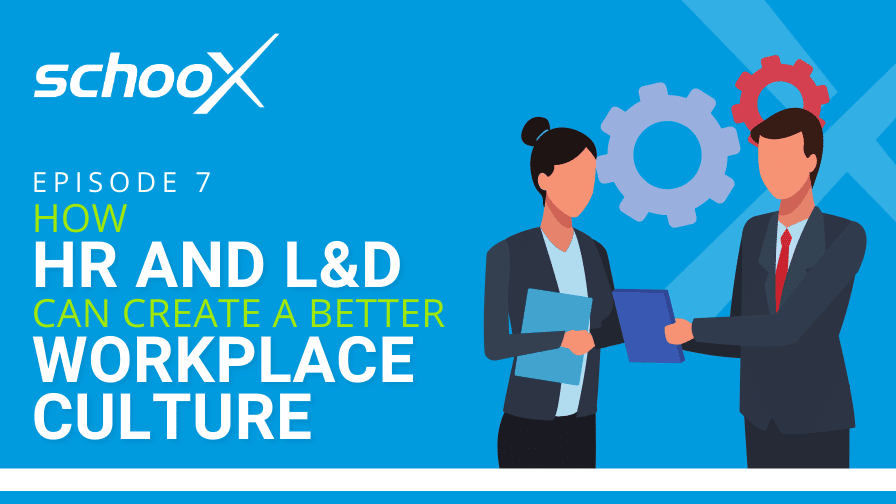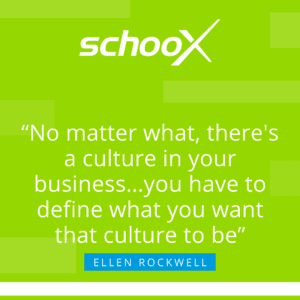24 November 2020
7

Human resources and learning and development are often seen as the relationship-building teams of the workforce. But when they collaborate, they can unlock so much potential for improving your workplace’s culture.
In our very first interview episode of The Learning Xchange, host Matthew Brown speaks to Ellen Rockwell, Founder and Chief People Officer at JRW Partners. Ellen is an expert in the HR and L&D sectors and joined Matthew to share her thoughts on the active role of HR in learning and development and how the partnership between them can help to shape organizations.
Hit play to listen to this episode of the podcast below:
Or find out more by reading on.
How business transformations impact HR and L&D
As organizations encounter change, HR departments assume greater responsibility. With the substantial changes and transformations that many organizations have faced this year, HR has played an increasingly active role in learning and development’s deployment strategy.
Ellen states that the events of 2020 are a great opportunity to show that relationship building is vital to a successful organization, not just between people, but departments too.
In fact, Ellen believes that inter-department relationships are key to effectively implementing transformative strategies. She notes that the relationship between HR and L&D can have a powerful impact on your organization.
This relationship commonly divides into two parts. The first part is with the HR team, as they are responsible for designing materials, or otherwise, that needs to be integrated into the company, for example, policies and procedures. The second part involves L&D as they create ways to incorporate them into the organization effectively.
“Our learning and development teams typically get to be the creatives. They get to have a lot of fun with how we actually implement and then integrate, whether it’s a policy or procedure compliance check, a mission statement, the values–whatever that topic might be–and be able to partner those together.”
The importance of culture ambassadors

These relationships, both person to person and department to department, are key to influencing your workplace culture.
Your company’s culture is defined at the top of the organization and filters down more or less successfully, depending on your culture integration strategy. Ellen believes that HR and L&D are the best departments to act as culture ambassadors, as their roles stretch company-wide and are rooted in relationship-building.
“I think that’s where HR has really been able to partner with learning and development to say, all right, we know that this is our company’s mission or manifesto or values, whatever that may be. But how can we figure out a way to actually make this come to life within our business?”
The most successful way Ellen has seen organizations develop their culture has been through partnerships and relationships.
How to build a relationship-based culture
Ellen believes that you can create culture in two steps: firstly, by building relationships, and secondly, by sharing and developing.
To build relationships, begin by picking up the phone. Any basic interaction, from simply saying hello, to asking what projects they’re working on, can start the ball rolling to create a good workplace relationship. Ellen is no stranger to introducing herself and recognizes the power in interacting with your colleagues.
“When I was in the office, I would actually schedule time on my calendar every single day, to go and walk and say hi to everybody in different areas of the office.”
Making time to talk to your colleagues shows that you care. This is pivotal for both HR and L&D teams if they want to leverage these relationships to create a culture of trust.
Trust is a vital part of these relationships, as this gets employees to share their true feelings and show vulnerability. The benefits of this are two-fold. A culture of trust will increase the employee’s ability to listen and learn successfully, but accessing your employees’ thoughts and feelings can also help HR and L&D direct the organization going forward.
Ellen does have a word of warning, that not everybody will be willing to build these relationships with you, and that’s OK. The important thing is to make sure that everyone feels invited to participate, whether they want to join in or not.
The second step is to share your thoughts and strategies with other members of your organization and use the trust you’ve built to get honest, useful responses. This two-way communication is key to ensuring everyone feels like they’re heard. Repeating this process can help you find out what’s working in your company’s culture, and what needs to adapt or change to make your workforce happier and more successful.
How culture impacts learning
Your organization’s approach to learning greatly affects your employees’ approach to learning. If there is an encouraging culture around personal development or employee learning, your teams are more likely to engage with learning materials positively.
Ellen describes how important it is to explain your expectations for employee learning and why they have to take part in a particular training. She shared a story about her learning experience when she made an annual compliance course mandatory.
“I understood that people were taking offense to me asking them to complete this compliance course again, because they thought that I felt they didn’t have good integrity. And that was the furthest thing that I had been thinking in my mind. My mind was, ‘let me remind you of our policies and procedures so that you can make great decisions.’ I needed to make sure that I created a culture of openness, so that they understand why I want them to do something.”
An openness around why learning is vital helps people understand more about the organization as well as what they can achieve. People who are willing to learn more will elevate their performance as their knowledge increases. This creates a fantastic culture of happy learners who perform better, leading to more business wins. It’s a process and a culture that sets everyone up for success.
Why a fun and happy culture is Ellen’s first choice
While you might not necessarily use the word “fun” to describe this culture, Ellen proposes that there’s no need to shy away from it. Ellen champions businesses that prioritize fun as part of their culture because it’s a well-known fact that people retain information far better when they’re in a happy environment.
“We can have the best of intentions for people to want to learn and want to grow things. But we need to work on our culture of being a good place to work.”
It’s a no-brainer that people will be more willing to show up and do a great job every day if they’re in a supportive and fun environment. This will look different for every business. Some need to maintain a level of seriousness appropriate to their workplace but some could experiment with a more relaxed approach. How could your organization improve with a more fun workplace culture?
No matter what your culture is, there is always an opportunity to change it. HR and L&D can be instrumental forces in identifying any problems and areas for growth and implementing a new strategy throughout your organization through these powerful, positive relationships.
Ellen shared her mantra for her approach to developing culture and why it’s important for her to “help people have a happy day.”
“I think if you can help people have a happy day at work, they go home and have a happy time with their family and their friends. And I feel like the more people are happy, the kinder the world can be.”
To hear Ellen’s thoughts in full, listen to the exclusive interview with her on this special episode of The Learning Xchange. Just scroll to the top of this post and hit play on the podcast player!
If you want to connect with Ellen, you can find her on LinkedIn.
This won’t be our last interview episode—we’ve got plenty more to come! So, to make sure you never miss one, subscribe to The Learning Xchange on your favorite podcast app today. It’s available wherever you get your podcasts.
RELATED RESOURCES



